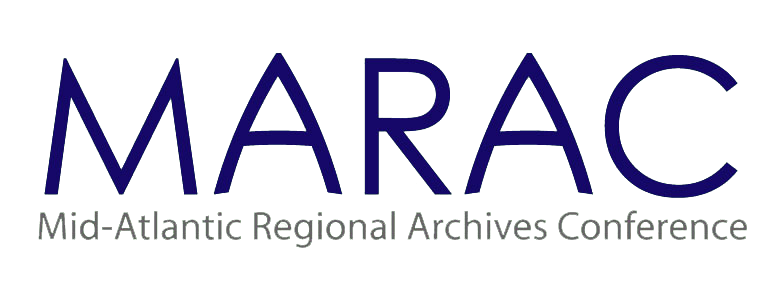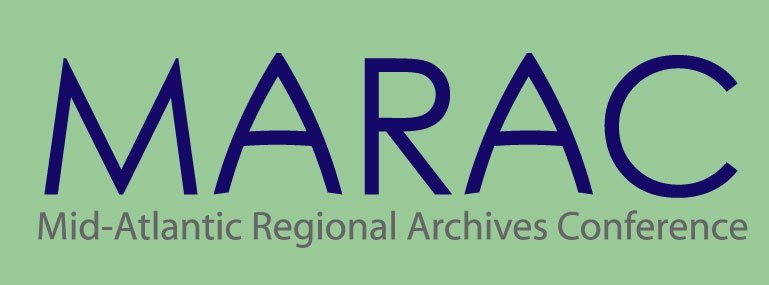Strategic Plan for 2024-2026PDF of the Strategic Plan can be downloaded HERE MissionTo provide high-quality, affordable archival education; encourage diversity, inclusivity, and accessibility in the profession; foster collegiality among archival workers; and support archival advocacy throughout the Mid-Atlantic region. Vision StatementThe Mid-Atlantic Regional Archives Conference (MARAC) seeks to engage all those who work with archives in our region and create a welcoming, supportive educational community. Core ValuesMARAC operates under these values: ● High-quality, affordable archival education ensures the viability of archives and supports the efforts of archival workers. Objectives of the Strategic PlanBetween January 1, 2024, and June 30, 2026, MARAC will pursue the following strategic objectives: Objective 1: To provide high-quality, affordable archival education to members. Goal A: MARAC will develop at least one workshop and one conference session related to mental health concerns for the archival profession. The Education and Meetings Coordinating committees will ensure that this goal is reached by the end of FY26. These committees will also work with the Finance Committee to investigate and ensure affordable pricing. Money for professional facilitators may be required. Some related programming is already scheduled for the spring 2024 symposium; lessons learned from that event can be applied to future programs. Goal B: MARAC will update and complete the Meetings Manual, including guidance for virtual conferences, and will ensure that every new conference committee is familiar with its contents. The Meetings Coordinating Committee will ensure the manual's completion by the end of FY24 and will provide a copy to the chairs of every Local Arrangements, Program, or Virtual Arrangements committee. No fiscal impact is expected. Goal C: The Finance Committee will investigate the use of the Archival Education Fund, as well as other methods, for ensuring the affordability of workshops and conferences. The Finance and Education committees together will develop guidelines for the use of the Archival Education Fund. The Finance Committee and Treasurer will also focus on registration rates for workshops and conferences, balancing affordability to participants with fiscal responsibility to the organization. Goal D: The Meetings Coordinating Committee will evaluate future meeting needs, schedules, and policies. The Meetings Coordinating Committee will establish and maintain a two-year plan for virtual and in-person meetings by the spring 2025 in-person conference. Objective 2: To increase diversity, inclusivity, and accessibility in the organization and in the profession. Goal A: The MARAC Web Team will monitor the accessibility of all resources available through the MARAC website and social media platforms. The MARAC Web Team will ensure that all resources, especially PDF, photo, and video resources, are accessible to assistive technologies by the end of FY25. To achieve this goal, the Web Team will run all content through an accessibility checker yearly and develop a remediation plan for objects found to be inaccessible. Goal B: MARAC will commission a task force to investigate and test methods for making all MARAC meetings fully accessible for attendees. The Steering Committee will enable a task force by the end of FY24 that will have findings ready for use at the spring 2025 in-person conference. The task force will work with the Treasurer to ensure that methods are cost-effective and sustainable. The Meetings Coordinator will ensure that the task force is able to put methods in place for the spring 2025 in-person conference, and that future conferences integrate successful methods to ensure accessibility into the future. This goal will likely have a large financial impact on conference budgets, as well as potentially the organizational budget. The task force will explore ways of making this financially viable. Goal C: MARAC will work to collaborate with cultural heritage institutions across the region in an effort to encourage connections with historically excluded people and increase MARAC’s inclusive programming and recruitment. Caucus Representatives will work with the Diversity and Inclusion Committee to make a list of relevant contacts, draft introductions and event invitations, and develop connections with staff at these institutions by the spring 2025 in-person conference. The Program and Diversity and Inclusion committees will ensure that conference committees tailor a call for proposals to this audience to increase representation at meetings. No fiscal impact is expected. Goal D: MARAC will offer comprehensive options for all dietary needs in all meeting and conference settings. The Meetings Coordinating and Education committees will ensure that dietary needs for attendees are being accommodated at all in-person events, starting with the spring 2024 symposium. Questions about dietary needs will be prominent on all registration forms, procedures will be clearly documented in the Meetings Manual, and liaisons with hotel and event staff will ensure that procedures are followed. All food at all buffets will be clearly labeled. The Communications and Web committees will develop messaging about this goal on the MARAC website and social media platforms, with the goal of increasing awareness about our accommodations among the membership. Little fiscal impact is expected as most vendors are happy to provide accommodation for special dietary needs. Objective 3: To create sustainable and more nimble financial and organizational infrastructures. Goal A: MARAC will maintain financial stability by monitoring and responding to the effects of external economic pressures on budgets. The Finance Committee will investigate the necessity of a dues increase by the end of FY24 and will consider additional dues categories to assist members in financial need. This goal is intended to help stabilize the organizational budget for future fiscal years. Goal B: MARAC will assess the structure of all committees in order to increase the effectiveness of operations. The Steering Committee will commission a Task Force on Committees that will assess the efficiency and effectiveness of each committee, starting with the Awards Committee. Updates to the Operations Manual for each committee will be made as needed. Work will be completed by the end of FY25. No fiscal impact is expected. Goal C: The MARAC Awards Committee will update the Operations Manual to reflect the current state of its work. The Secretary will work with the Awards Committee chair and subcommittee chairs to update the Operations Manual for each award. The Awards Committee chair will work with subcommittee chairs to review existing subcommittee documentation, create templates, and develop a list of venues for calls and winner announcements by the end of FY25. No fiscal impact is expected. A bylaws change is expected to follow the completion of this goal. Goal D: MARAC will publish regular features in the Mid-Atlantic Archivist (MAA) about the workings of each committee. The committees will develop a plan to regularly publish pieces in the MAA detailing their activities, starting in FY25. The Communications Committee and committee chairs will identify topics, frequency, and authors, and will update the Operations Manual detailing their plan. No fiscal impact is expected. Goal E: MARAC will refocus the roles of Caucus Representatives to empower them to fulfill their duties in ways that reflect their state communities. The Secretary will work with Caucus Representatives to create a general description and a state-specific description for each state in the Operations Manual by the end of FY25. The Treasurer will work with Caucus Representatives to accurately forecast funding needs when developing the fiscal year budget, starting with the FY25 budget, and will work with the Finance Committee to ensure that funds are distributed equitably and in accordance with forecasts. Additional funding in the Caucus budget may be required. Objective 4: To support opportunities for advocacy and outreach across the region and in the profession. Goal A: Caucus Representatives will be empowered to develop state-specific outreach programs. The Chair-Elect will conduct a quarterly meeting of the Caucus Representatives to promote their activities and to assist with planning events, including events in small repositories (house museums, community archives, volunteer-run organizations, etc.) in order to attract new members and retain existing members. Goal B: MARAC will develop workshops or webinars on educational opportunities for professionals actively working within the archival field who do not have formal training and/or archives-related degrees. The Education Committee will work with Caucus Representatives to develop a workshop by the end of FY25, will host it virtually, and will make the recording available on YouTube for broader distribution. The Education Committee will distribute a survey of MARAC members who don’t hold formal degrees in archival work and will develop the workshops or webinars based on their recommendations. They will investigate the feasibility of hosting this type of workshop regularly. This may require funding for professional facilitators. The Education Committee also will investigate creating an in-person workshop to be presented throughout the MARAC region. Goal C: MARAC will form a working group on climate change to recommend what the organization’s role should be in helping its members deal with climate change impacts. The Executive Committee will form a working group at the beginning of FY25. No fiscal impact is expected from the operations of the working group; however, the group may recommend items that carry an unanticipated cost. Goal D: MARAC will advocate for and support its members by collating disaster preparedness resources and offering at least one related program each year. The Education and Communication committees will work together to identify a facilitator and host for at least one disaster preparedness workshop or programming event each year by the end of FY25. The Communications Committee and Web Team will partner with the goal of increasing awareness of the Disaster Relief Fund by the end of FY25. The Steering Committee will formalize the guidelines for use of the fund and brainstorm ways to replenish the fund by the end of FY25. The committees will collate and develop messaging about existing resources for disaster preparedness. Goal E: MARAC stands in support of the Society of American Archivists Core Values and Code of Ethics. MARAC may respond to challenges and advocate for our members and colleagues in related fields in solidarity with this statement and our mission and core values. Caucus Representatives will stay abreast of state-level issues while the Chair and Chair-Elect will maintain awareness of federal issues. All official statements and letters will be drafted by the Chair and Chair-Elect, and be reviewed by the Steering Committee in a timely and urgent matter. No fiscal impact is expected. Goal F: MARAC will create a Member Retention Task Force to work on retaining existing members of the organization. The Chair and Chair-Elect will convene the task force by the end of FY24. The Member Retention Task Force and Administrator will compose a survey to gather information about reasons why members stay, leave, and/or return, and will propose initiatives and publications to improve member retention. A member retention goal will be set after the results of the survey are assessed. The Membership Committee and Web Team will work with the Member Retention Task Force to assess existing assets and identify gaps in FY25. New resource development and/or redesigns will occur after the Member Retention Task Force has finished its analysis. One-time design costs are anticipated. Because MARAC primarily swaps advertising space and table presence with other organizations, additional distribution costs are not expected. Approved by the Steering Committee March 8, 2024 |

